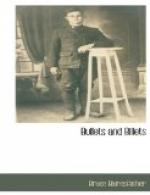“Boom!” That was all; but I knew it was the voice of the guns, and in that moment I realized that here was the war, and that I was in it.
I ploughed along for about four miles down uninteresting mud canals—known on maps as roads—until, finally, I entered Nieppe.
The battalion, I heard from a passing soldier, was having its last day in billets prior to going into the trenches again. They were billeted at a disused brewery at the other end of the town. I went on down the squalid street and finally found the place.
A crowd of dirty, war-worn looking soldiers were clustered about the entrance in groups. I went in through the large archway past them into the brewery yard. Soldiers everywhere, resting, talking and smoking. I inquired where the officers’ quarters were, and was shown to the brewery head office. Here I found the battalion officers, many of whom I knew, and went into their improvised messroom, which, in previous days, had apparently been the Brewery Board room.
I found everything very dark, dingy and depressing. That night the battalion was going into the trenches again, and last evenings in billets are not generally very exhilarating. I sat and talked with those I knew, and presently the Colonel came in, and I heard what the orders were for the evening. I felt very strange and foreign to it all, as everyone except myself had had their baptism of trench life, and, consequently, at this time I did not possess that calm indifference, bred of painful experience, which is part of the essence of a true trench-dweller.
The evening drew on. We had our last meal in billets—sardines, bread, butter and cake sort of thing—slung on to the bare table by the soldier servants, who were more engrossed in packing up things they were taking to the trenches than in anything else.
And now the time came to start off. I found the machine-gun section in charge of a sergeant, a most excellent fellow, who had looked after the section since the officer (whose place I had come to fill) had been wounded. I took over from him, and, as the battalion moved off along the road, fell in behind with my latest acquisition—a machine-gun section, with machine guns to match. It was quite dusk now, and as we neared the great Bois de Ploegstert, known all over the world as “Plugstreet Wood,” it was nearly night. The road was getting rougher, and the houses, dotted about in dark silhouettes against the sky-line, had a curiously deserted and worn appearance. Everything was looking dark, damp and drear.




